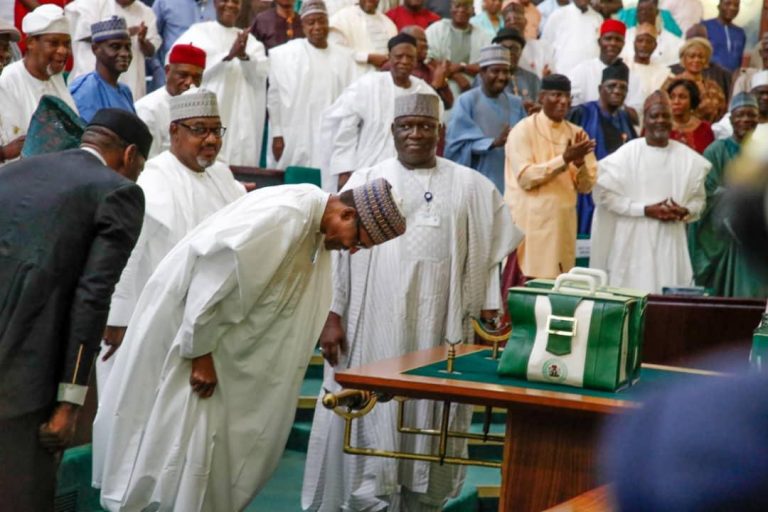•Reports N30.48tr In Total Banks’ Credit To Private Sector
The Central Bank of Nigeria (CBN), on Thursday, published its Financial Stability Report for the year 2018, showing, among others, that budget deficit for the year stood at N3.426tr, significantly higher than the N2.005tr or 1.77% of GDP, projected for the period.
A breakdown of the deficit in the fiscal operations of the Federal Government in the second half of 2018 stood at N1.765tr or 2.57% of GDP, higher than N1.66tr, 2.81% of GDP in the first half.
The deficit was financed, mainly, according to the report, through domestic sources.
According to the report, the Federal Government’s retained revenue for the second half of 2018, stood at N3.605tr. A breakdown of the figure showed that at N1.952tr, the deficit level was lower than the half-year budget figure and the receipts in the preceding half of 2018 by 48.3 and 1.7%, respectively.
A breakdown of the retained revenue showed that the share of the Federal Government from the Federation Account was N1.653tr (about 84.68%); VAT Pool Account, N80.08 billion (4.10%); Federal Government Independent Revenue, N68.53bn (3.51%); Excess Non-oil, N6.18bn (0.32%); Exchange Gain, N63.81bn (3.27%); and Additional Nigerian National Petroleum Corporation (NNPC) share, N5.5bn (0.28%).
Others included Abuja’s balance of the Special Accounts, the unspent balance from the previous year, transfers to the Consolidated Revenue Fund (CRF), all of which accounted for the balance of N75.01bn (or 3.84%).
“The decrease in retained revenue relative to the first half was attributed mainly to the fall in Federal Government Independent Revenue,” the report added.
The deficit, therefore, arose from the fact that the Federal Government spent a total of in N3.717tr in the second half of 2018, lower than the half-year budget figure by 21.8%, which was higher than the preceding half-year by 2%.
A breakdown of the figure showed that the Federal Government 85.8% of the amount went to recurrent expenditure, leaving 8.1% for capital expenditure, while transfers gulped the remaining 6.1%.
A further breakdown of the recurrent expenditure indicated that non-debt obligations accounted for 53.5%, just as 46.50% went into debt service payments.
As a result of these borrowings, the government’s consolidated domestic debt stock at end-December 2018, the CBN continued, stood at N12.443tr, reflecting an increase of 2.4% over the N12.151tr recorded at end-June 2018.
The bulk 73.41% of these debts were held in FGN Bonds, while the Nigerian
Treasury Bills constituted 21.99%, with the FGN Sukuk and Green Bond accounting for 1.61% and 0.09% of the total domestic debt stock respectively; just as FGN Special Bonds, Savings Bonds and Nigerian Treasury Bonds accounted for 1.61, 0.09 and 1.21% respectively.
Within the period under review, the CBN reported a foreign exchange inflow of $59.42bn, while outflow stood at $56.332bn, resulting in the net inflow of $3.089bn. A breakdown of the figure showed that inflow in between January and June 2018 amounted to $30.511bn, while outflow stood at $22.942bn, amount to a net inflow of $7.569bn. In the second half, however, inflow dropped to $28.91bn, compared to the $33.39bn outflow resulting in a net outflow of $4.48bn. The situation in the second half of the year was a departure from what happened in the corresponding period of 2017, when inflow amounted to $27.799bn, while outflow came to $18.959bn, which translated to a net inflow of $8.84bn, according to the FSR.
Nigeria’s major inflow sources, the CBN noted, were mainly “crude oil sales, treasury single account, investment income, and other official receipts.”
The report also noted the N30.475tr total banking sector credit to the private sector in both half of 2018, the second half recording 1.35% drop from N15.34tr at the end-June 2018, to N15.134tr in the second half.
The industry sub-sector accounted for the highest share of total credit with N12.103tr, or 39.71%; with N5.899tr or 38.46% at the end of June, followed by N6.203tr or 40.99% by December-end. It was followed by “others” with N4.498tr or 14.76% for the entire year, led by N2.423tr or 15.8% in June 2018, and N2.074tr or 13.71% by December. Banking sector credit to government dropped from N1.474tr (9.61%) in June to N1.362 (9.00%) at the end of December; ahead of the oil & gas sector’s N1.235tr (8.05%) and N1.096tr (7.25%) in the first and second halves respectively, among others.
Trending Today
Menu








